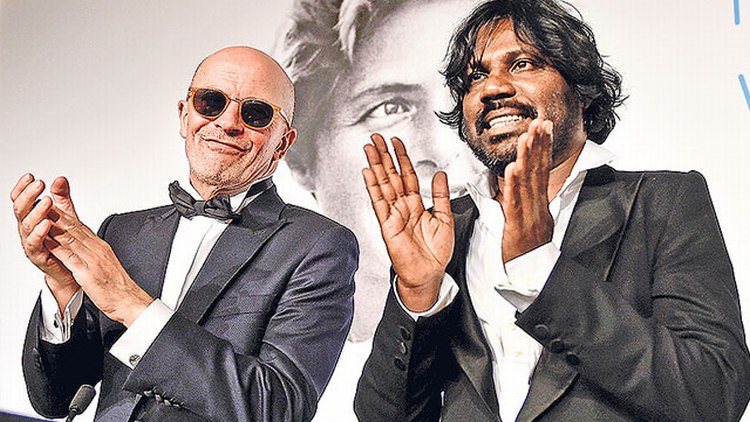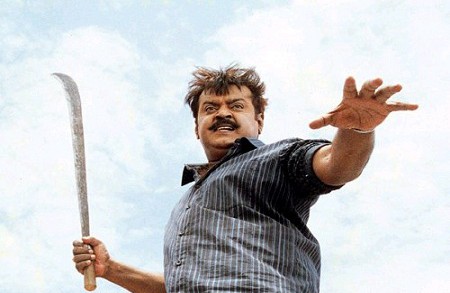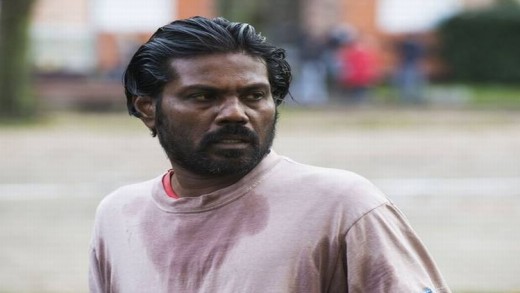The hero of the 2015 Palme d’Or film Dheepan is Anthony Thasan, 47, a former Liberation Tigers of Tamil Eelam (LTTE) militant. To friends, and fans of his fiction in Tamil, he is known as Shoba Sakthi. On some days, he answers to the name Anthony X.
In his first book, Gorilla, a literary sensation in the Tamil underground when first published in 2001, he is Rocky Raj, the fictionalised alter-ego of his fighting years. He lives in Paris – his status there being that of an immigrant – and has washed dishes in fast-food joints and worked in supermarkets. The information he offers about himself in this conversation is precise and unsentimental. His contiguous identities seem like different floors of a building without stairs. Perhaps they are a way to fob off knocks to his inner core. In an email interview, the writer-actor talks of his journey from Sri Lanka to Paris, and landing the leading part in auteur Jacques Audiard’s immigrant film.
Why did you join the Liberation Tigers of Tamil Eelam?
I joined the LTTE when I was 16 years old. Though there were many armed pro-Tamil groups at that time, the LTTE was the only guerrilla outfit that showed an ability to go the distance. LTTE’s motto – of achieving an egalitarian, socialist Tamil Eelam – also impressed me a lot.
What was Prabhakaran like as a leader?
I met Prabhakaran only once, at a public meeting. Prabhakaran started working towards the freedom of Tamils at age 17. But the path he chose to realise his goal was violence. He lacked tolerance. As days passed, he transformed from being the head of a freedom movement to a warlord who used military tactics without any compromise. Though he said he fought for the freedom of the Tamils, during the final stages of the war, he had begun to use them as hostages. He is also the major reason why at least 1 lakh Tamils were killed in the final war. He is not a leader to be revered.
Ultimately you had to leave the LTTE and escape Sri Lanka. Which decision was harder?
I felt free when I quit the LTTE. I felt relaxed; I had moved away from the wrong path. I never thought of abandoning my country. But the relentless war during the IPKF’s [Indian Peace Keeping Force’s] stint in my country, and the Indian Army’s insensitivity, the way in which they killed my fellow citizens, forced me to abandon my country and escape. The day I left my country was the darkest day of my life.
How did you end up in France?
I left alone, escaping to Hong Kong and then making my way to Thailand. I spent three-and-a-half years in Thailand as a refugee and all the while I plotted my departure to Europe. Refugees were not treated well by the Thailand government. They neither gave us visas nor work permits. In 1993, I managed to reach France. It had taken me five years to get there.
Why was India not an option?
I was afraid to enter India as, at the time, India’s war against the LTTE was at its peak. Sri Lankan refugees were being treated like criminals in India.
Your first film was banned in India. How did that happen?
Sengadal [The Dead Sea] was my first film. I joined its crew as screenplay and dialogue writer. I also gave a guest appearance. The censor board refused to issue a certificate as the film touched some raw nerves due to the way it directly criticised the Indian and Sri Lankan governments. However, due to director Leena Manimekalai’s persistence and her legal battle, the film finally got the certificate. Sengadal is the only Tamil film to have been screened at the 42nd International Film Festival of India.
What is your current status in France? What is the most difficult part of the immigrant life?
I’m still a political refugee. Yes, there is racism in this country too, but my life is secure. There are no boundaries to individual freedom. But I don’t have any political rights here. Even though I’m a political person, I have never cast a vote. This is unacceptable.
How do you earn a living in France?
I’m a full-time writer. But that is not enough for my bread and butter. To make ends meet, I work part-time at restaurants and supermarkets. After I exhaust the salary I received for this film, I’ll take up these chores again.
Read the rest of the original article here.
* * * * *
Related Articles:
“Sri Lankan Tamil thriller brings refugee crisis to Cannes film festival”
“Prestigious Palme d’Or award goes to ‘Dheepan’ at Cannes Festival”

 Tamil Culture
Tamil Culture







